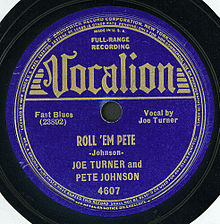Rock and roll is a genre of popular music that evolved in the United States during the late 1940s and early 1950s. It originated from African American music such as jazz, rhythm and blues, boogie-woogie, electric blues, gospel, and jump blues, as well as country music. While rock and roll's formative elements can be heard in blues records from the 1920s and in country records of the 1930s, the genre did not acquire its name until 1954.

Joseph Vernon "Big Joe" Turner Jr. was an American blues shouter from Kansas City, Missouri. According to songwriter Doc Pomus, "Rock and roll would have never happened without him". Turner's greatest fame was due to his rock and roll recordings in the 1950s, particularly "Shake, Rattle and Roll", but his career as a performer endured from the 1920s into the 1980s.
Boogie-woogie is a genre of blues music that became popular during the late 1920s, developed in African-American communities since the 1870s. It was eventually extended from piano to piano duo and trio, guitar, big band, country and western music, and gospel. While standard blues traditionally expresses a variety of emotions, boogie-woogie is mainly dance music. The genre had a significant influence on rhythm and blues and rock and roll.
Jump blues is an up-tempo style of blues, jazz, and boogie woogie usually played by small groups and featuring horn instruments. It was popular in the 1940s and was a precursor of rhythm and blues and rock and roll. Appreciation of jump blues was renewed in the 1990s as part of the swing revival.
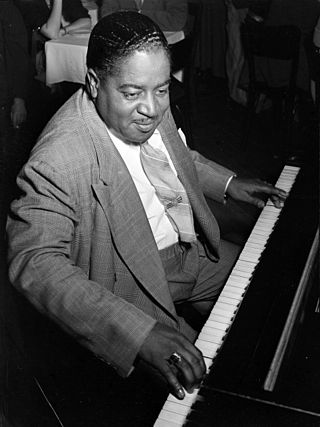
Kermit Holden "Pete" Johnson was an American boogie-woogie and jazz pianist.
Clarence "Pinetop" Smith, was an American boogie-woogie style blues pianist. His hit tune "Pine Top's Boogie Woogie" featured rhythmic "breaks" that were an essential ingredient of ragtime music, but also a fundamental foreshadowing of rock and roll. The song was also the first known use of the term "boogie woogie" on a record, and cemented that term as the moniker for the genre.
A blues shouter is a blues singer, often male, capable of singing unamplified with a band.
The origins of rock and roll are complex. Rock and roll emerged as a defined musical style in the United States in the early to mid-1950s. It derived most directly from the rhythm and blues music of the 1940s, which itself developed from earlier blues, the beat-heavy jump blues, boogie woogie, up-tempo jazz, and swing music. It was also influenced by gospel, country and western, and traditional folk music. Rock and roll in turn provided the main basis for the music that, since the mid-1960s, has been generally known simply as rock music.
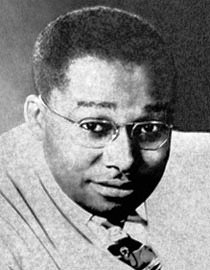
Joseph Christopher Liggins, Jr. was an American R&B, jazz and blues pianist and vocalist who led Joe Liggins and his Honeydrippers in the 1940s and 1950s. His band appeared often on the Billboard magazine charts. The band's biggest hit was "The Honeydripper", released in 1945. Joe Liggins was the older brother of R&B performer Jimmy Liggins.
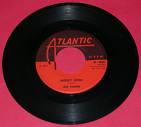
"Honey Hush", is a blues song, written by Big Joe Turner, recorded in May 1953 in New Orleans, Louisiana, and released that August by Atlantic Records. It was a number-one song on Billboard's Rhythm and Blues chart for eight weeks.

Count Basie at Newport is a live album by jazz musician Count Basie and his orchestra. It was originally issued as Verve MGV 8243 and included only the tracks 1-7 and 13. Tracks 9-12 originally included in Count Basie & Joe Williams/Dizzy Gillespie & Mary Lou Williams at Newport.
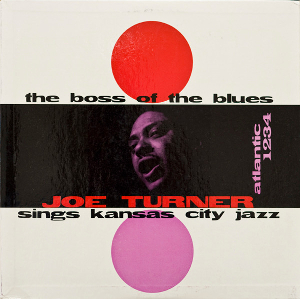
The Boss of the Blues is a 1956 album by the American singer Big Joe Turner. Originally released on the Atlantic label, the album has been reissued many times on cassette and CD by Atlantic, Rhino and Collectables.
Boogie rock is a style of blues rock music that developed in the late 1960s. Its key feature is a repetitive driving rhythm, which emphasizes the groove. Although inspired by earlier musical styles such as piano-based boogie-woogie, boogie rock has been described as "heavier" or "harder-edged" in its instrumental approach.
Vince Weber was a German blues and boogie-woogie pianist.

"Guitar Boogie" is a guitar instrumental recorded by Arthur "Guitar Boogie" Smith in 1945. It was one of the first recordings in the style later dubbed "hillbilly boogie" to reach a widespread audience, and eventually sold nearly three million copies. It was the first guitar instrumental to climb the country music charts, and then crossover and also gain high rankings on the popular music charts. "Guitar Boogie" has been interpreted and recorded by a variety of musicians. It is among the songs discussed as the first rock and roll record.

Kenny "Blues Boss" Wayne is an American blues, boogie-woogie and jazz pianist, singer and songwriter. Music journalist, Jeff Johnson, writing in the Chicago Sun-Times stated, "There's no boogie-woogie-blues piano man out there today who pounds the 88's with the conviction of Kenny "Blues Boss" Wayne."
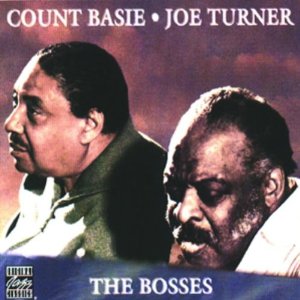
The Bosses is a 1973 album by American blues shouter "Big Joe" Turner accompanied by a small group led by Count Basie, recorded in 1973 and released on the Pablo label.

Breakfast Dance and Barbecue is a live album by pianist, composer and bandleader Count Basie and his Orchestra with vocalist Joe Williams featuring tracks recorded at a Disc Jockey convention in Florida in 1959 and originally released on the Roulette label.

Boogie Woogie is a compilation album containing four 10-inch, 78 rpm records of boogie-woogie music. The songs on the album were recorded over a period of three years from 1936 to 1939, then released in 1941 on this compilation album by Columbia Records (C44). Artists featured on the album include Harry James, Count Basie, Big Joe Turner, and the three prominent boogie-woogie pianists of the time, Albert Ammons, Pete Johnson, and Meade Lux Lewis.
